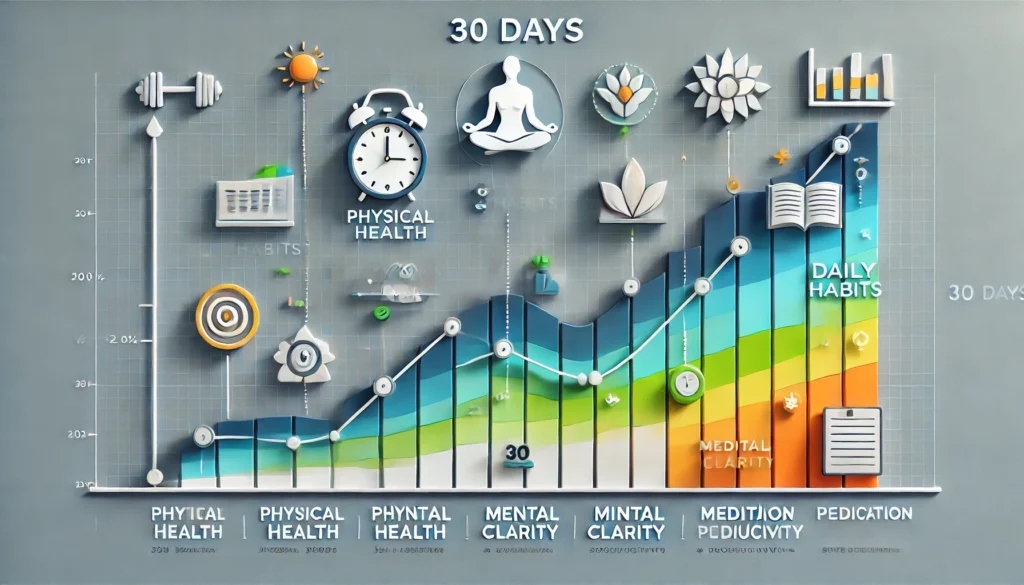Making positive changes in your life doesn’t always require drastic transformations. In fact, small, consistent habits practiced over 30 days can significantly enhance your physical health, mental well-being, and productivity. Interestingly, scientific studies reveal that it takes around 21 to 30 days to form a new habit. Therefore, by repeating small actions regularly, you can gradually rewire your brain and improve your lifestyle.
This article explores evidence-backed habits that can transform your life in just one month. Moreover, from mindfulness techniques and productivity boosters to wellness-enhancing rituals, these small changes consistently lead to long-term improvements.

The Science Behind Habit Formation
Developing new habits involves the brain’s neuroplasticity, which allows it to reorganize and form new neural connections. When you repeat an activity regularly, your brain strengthens the associated neural pathways. Consequently, research by Dr. Phillippa Lally reveals that it takes approximately 66 days on average to fully automate a new habit. However, noticeable changes often occur within 30 days, creating a strong foundation for long-term behavior modification.
How Habits Impact Your Life
- Emotional well-being: Consistent routines reduce stress by providing stability and predictability. As a result, you experience a greater sense of emotional balance.
- Physical health: Regular habits such as exercising or hydrating gradually enhance overall wellness. Therefore, you become healthier over time.
- Productivity and focus: Structured habits boost time management skills and minimize mental fatigue. Thus, you can accomplish more with less effort.
Morning Habits for a Productive Start
Practicing Mindful Breathing
Starting your day with mindful breathing reduces cortisol levels, the hormone associated with stress. Moreover, scientific evidence published in Frontiers in Psychology highlights that mindful breathing enhances mental clarity, improves focus, and lowers anxiety.
How to do it:
- First, find a quiet space where you won’t be disturbed.
- Next, inhale slowly for four seconds, hold for four seconds, and exhale for four seconds.
- Finally, repeat this for 5-10 minutes to maximize the benefits.
Drinking Water Before Coffee
Hydrating your body immediately after waking up kick-starts your metabolism and flushes out toxins. Furthermore, studies indicate that drinking 500 ml of water can increase metabolic rate by 30% for up to 40 minutes.
Tip:
- To boost the benefits, add a slice of lemon for extra antioxidants and improved digestion.
Wellness Habits for Better Health
Daily Stretching or Yoga
Incorporating 10-15 minutes of stretching or yoga into your routine enhances flexibility, circulation, and joint health. Additionally, research by the American Council on Exercise (ACE) demonstrates that regular stretching reduces stiffness, preventing long-term muscle imbalances.
Benefits:
- Significantly improves posture and mobility, making daily movements easier.
- Furthermore, it enhances blood circulation, which reduces fatigue.
- Most importantly, it lowers stress by promoting the release of endorphins.
Eating Whole, Unprocessed Foods
Prioritizing whole, unprocessed foods can transform your overall health. Surprisingly, a 30-day clean eating challenge significantly reduces inflammation, boosts energy levels, and improves digestion. According to research from the Harvard T.H. Chan School of Public Health, whole foods lower the risk of chronic diseases by up to 30%.
Tips for clean eating:
- First, fill your plate with colorful fruits, vegetables, and lean proteins.
- Additionally, reduce refined sugars and avoid processed carbs.
- Finally, incorporate healthy fats like avocado, nuts, and seeds.
Mental Health Habits for a Calm Mind
Journaling for Gratitude
Writing down things you’re grateful for every day enhances mental well-being. Moreover, studies published in Journal of Personality and Social Psychology reveal that gratitude journaling reduces depression symptoms by 35%.
How to start:
- Begin by writing about three things you’re grateful for each day.
- Then, reflect on how they positively influenced your mood or experiences.
Practicing Digital Detox
Limiting screen time, especially before bed, significantly improves sleep quality and reduces mental fatigue. Since blue light exposure disrupts melatonin production, it interferes with sleep cycles. However, research by the National Sleep Foundation shows that a one-hour screen detox before bedtime enhances sleep quality by 30%.
Tips:
- To begin, switch off notifications at least an hour before sleeping.
- Additionally, use blue light filters during evening screen use.
- Lastly, keep electronic devices away from your bed.
Productivity Habits for a More Effective Day
Time Blocking for Efficiency
Time blocking helps you allocate specific time slots for different tasks, boosting productivity. Interestingly, research from Stanford University reveals that this method increases productivity by 30% by reducing decision fatigue and minimizing distractions.
How to apply it:
- First, divide your day into 30-90 minute blocks.
- Next, assign each block to a specific task or category.
- Lastly, take short breaks between sessions to prevent burnout.
The Two-Minute Rule
David Allen’s two-minute rule states that if a task takes less than two minutes, you should do it immediately. As a result, this reduces mental clutter and prevents small tasks from accumulating.
Examples:
- You can respond to short emails right away.
- Moreover, washing a dish immediately prevents buildup.
- Additionally, sending brief follow-ups or reminders becomes more efficient.
Evening Habits for Better Sleep
Reading Before Bed
Reading a physical book before sleep promotes relaxation by reducing cortisol levels. Surprisingly, a study by the University of Sussex found that just six minutes of reading before bed lowers stress by 68%.
Tips:
- To begin, choose light fiction, biographies, or self-help books.
- Furthermore, avoid digital screens to minimize blue light exposure.
Practicing Sleep Meditation
Guided meditation before bed improves sleep quality by calming your mind. In fact, studies published in JAMA Internal Medicine indicate that mindfulness meditation reduces insomnia symptoms by 58%.
How to practice:
- First, listen to a 10-15 minute guided meditation session.
- Next, focus on slow breathing and progressive body relaxation.
- Lastly, use apps like Headspace or Calm for easy access.
Building Long-Term Consistency
Tracking Your Progress
Monitoring your daily habits enhances accountability and increases the likelihood of consistency. Furthermore, habit-tracking apps such as HabitBull or Streaks provide visual reminders and motivation, helping you stay on course.
Tips:
- Start by using a journal or an app to log your daily habits.
- Additionally, celebrate small wins to maintain motivation.
- Finally, refine your habits as you go along.
The 30-Day Habit Challenge

Committing to a 30-day challenge helps build consistency and discipline. Moreover, James Clear, author of Atomic Habits, explains that short-term habit challenges reduce overwhelm and increase the chances of long-term success.
Challenge ideas:
- Walk 10,000 steps every day for a month.
- Follow the Pomodoro technique to boost productivity.
- Meditate for 10 minutes daily to improve mindfulness.
Conclusion
Incorporating simple yet impactful habits into your daily routine for 30 days can bring remarkable transformations. By enhancing productivity, mental clarity, and physical health, these practices create a foundation for lifelong positive change. Furthermore, staying consistent and mindful will help you reshape your lifestyle and achieve sustainable growth.
Embrace the power of small habits and watch them compound into meaningful, life-changing results.
